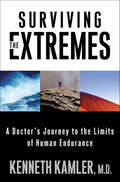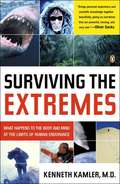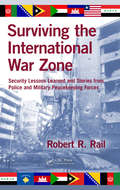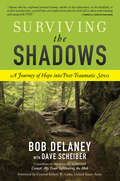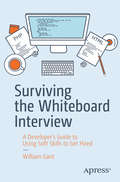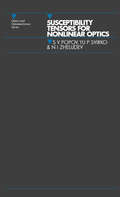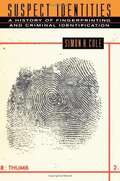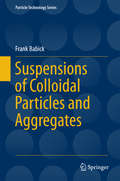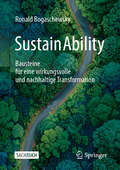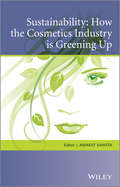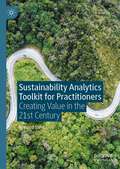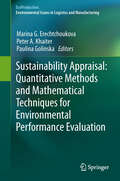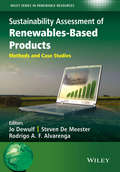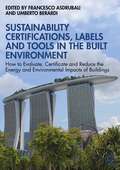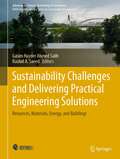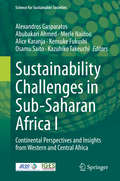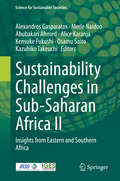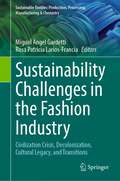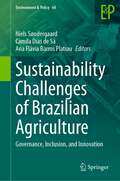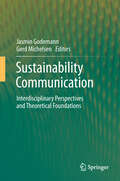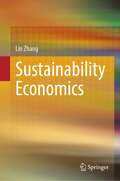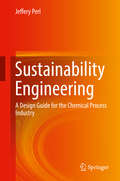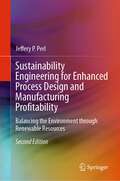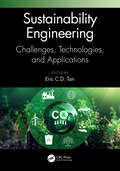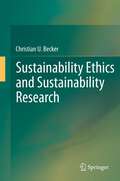- Table View
- List View
Surviving the Extremes: A Doctor's Journey to the Limits of Human Endurance
by Kenneth KamlerSurgeon, explorer, and masterful storyteller, Kenneth Kamler takes us to the farthest reaches of the earth as well as into the uncharted territory within the human brain. Surviving the Extremes is a scientific nail-biter no reader will forget.Physiological constraints confine our bodies to less than one-fifth of the earth's surface. Beyond that fraction lie the extremes. What happens when we go to them?Dr. Kenneth Kamler has spent years observing exactly what happens. A vice president of the legendary Explorers Club, he has climbed, dived, sledded, floated, and trekked through some of the most treacherous and remote regions in the world. A consultant for NASA, Yale University, and the National Geographic Society, he has explored undersea caves, crossed the frozen Antarctic wastelands, and stitched a boy's hand back together while kneeling in knee-deep Amazonian mud. He was the only doctor on Everest during the tragic expedition documented in Jon Krakauer's Into Thin Air and helped treat its survivors. Kamler has devoted his life to investigating how our bodies respond to "environmental insults"-a nice way of saying the things that can kill us-and watched while some succumbed to them and others, sometimes miraculously, overcome them.Words like "extreme" and "survival" have lost some of their value from overuse and media hype. By showing us what happens when life itself is at stake, and the body's capacities put to their greatest test, this book reminds us what they truly mean. Divided into six sections-jungle, open sea, desert, underwater, high altitude, and outer space-Surviving the Extremes uses first-hand testimony and documented accounts to illustrate what happens in environments where our instinctive survival strategies must become fully engaged. These stories reveal how infinitely complex are the workings of the human body-and also how heartbreakingly fragile. At the heart of this book is a quest for the source of our will to survive and the haunting question of why some can, and others cannot, summon its awesome and nearly mystical power at their moment of greatest need.
Surviving the Extremes: What Happens to the Human Body at the Limits of Human Endurance
by Kenneth KamlerA true-life scientific thriller no reader will forget, Surviving the Extremes takes us to the farthest reaches of the earth as well as into the uncharted territory within the human body, spirit, and brain. A vice president of the legendary Explorers Club, as well as surgeon, explorer, and masterful storyteller, Dr. Kenneth Kamler has spent years discovering what happens to the human body in extreme environmental conditions. Divided into six sections--jungle, high seas, desert, underwater, high altitude, and outer space--this book uses firsthand testimony and documented accounts to investigate the science of what a body goes through and explains why people survive--and why they sometimes don't.
Surviving the International War Zone: Security Lessons Learned and Stories from Police and Military Peacekeeping Forces
by Robert R. RailFew people are better able to describe how to survive in a war zone than those who have seen, experienced, and lived it firsthand. Presenting accounts written by military and police officers, this book offers an inside look at the lives of the officers and the local people living in the war zone environment. Covering many facets of daily life, the book examines topics such as surviving extreme temperatures and staying healthy, interacting with the indigenous population and cultural awareness, adjusting to the challenges of limited technology and resources, and protecting oneself from the imminent threat of violence that is present in all war-torn regions.
Surviving the Shadows: A Journey of Hope into Post-traumatic Stress
by Bob Delaney Dave ScheiberSurviving the Shadows is an uplifting journey through powerful and inspiring stories-marked by perseverance and personal courage-of an array of people who have suffered directly or indirectly from PTSD. Along the way Delaney introduces readers to medical experts who have developed ground-breaking methods in dealing with the disorder. And he explains the importance and effectiveness of peer-to-peer therapy as a crucial first step in the healing process-an approach for which he has won wide-spread support through his close work with military groups, law enforcement, and emergency services.
Surviving the Whiteboard Interview: A Developer’s Guide to Using Soft Skills to Get Hired
by William GantThe industry standard whiteboard interview can be daunting for developers. Let’s face it: it combines the worst aspects of a typical interview, on-the-spot public speaking, a quiz show, and a dinner party full of strangers judging you—all at once. Brilliant developers can let their nerves get the best of them and completely bomb a whiteboard interview, while inexperienced developers who excel in soft skills can breeze through them. In Surviving the Whiteboard Interview, author William Gant uses his real-world knowledge and expertise to guide you through the psychological roadblocks of a coding test while also providing you with a sample coding challenge. With enough preparation, information, and assured confidence, you can survive a whiteboard interview at any organization. In addition to the benefits listed above, Gant helps you explore how you can create a good soft skills impression that will last beyond the whiteboard test by showing your work ethic, positive attitude, and ability to take and implement criticism effectively. These assets will unequivocally serve other parts of your life outside of an interview context, as well. While Gant does not promise that you will ever truly enjoy interviewing, he does promise to arm you with the proper preparation techniques and knowledge needed to tame the common fears and dread that come along with it. Maximize your career potential and get inspired with Surviving the Whiteboard Interview. The steps to your dream role just might be closer than you think.What You Will LearnPractice both hard and soft skills required to succeed at a whiteboard interview, covering coding tests as well as psychological preparationLearn how to make other aspects of your interview stronger, so you can create a great impressionMaster solving common whiteboard problems in different programming languages Who This Book is ForThis book is primarily for aspiring software developers who are looking for a job in the field. However, it will also be helpful for more seasoned developers who find interviewing painful and want to improve their skills.
Susceptibility Tensors for Nonlinear Optics (Series In Optics And Optoelectronics Ser.)
by S.V PopovSusceptibility Tensors for Nonlinear Optics is a unique and invaluable reference book with accompanying software. Starting from basic principles, the book presents a detailed introduction to the concept of optical susceptibilities of crystalline media. Substantial appendices include useful tables of third-, fourth-, and fifth-rank susceptibility tensors for major nonlinear optical effects. Integral to the book is an entirely original TURBO RANK software package (compatible with PCs running MS-DOS and Windows) that allows the calculation of the symmetry of material tensors up to seventh rank, effectively superseding conventional reference tables of high rank tensors. This package is also useful for scientists working in solid state physics, crystallography, acoustics, and materials engineering.
Suspect Identities: A History of Fingerprinting and Criminal Identification
by Simon A. Cole"No two fingerprints are alike," or so it goes. For nearly a hundred years fingerprints have represented definitive proof of individual identity in our society. We trust them to tell us who committed a crime, whether a criminal record exists, and how to resolve questions of disputed identity. But in Suspect Identities, Simon Cole reveals that the history of criminal identification is far murkier than we have been led to believe. Cole traces the modern system of fingerprint identification to the nineteenth-century bureaucratic state, and its desire to track and control increasingly mobile, diverse populations whose race or ethnicity made them suspect in the eyes of authorities. In an intriguing history that traverses the globe, taking us to India, Argentina, France, England, and the United States, Cole excavates the forgotten history of criminal identification-from photography to exotic anthropometric systems based on measuring body parts, from fingerprinting to DNA typing. He reveals how fingerprinting ultimately won the trust of the public and the law only after a long battle against rival identification systems. As we rush headlong into the era of genetic identification, and as fingerprint errors are being exposed, this history uncovers the fascinating interplay of our elusive individuality, police and state power, and the quest for scientific certainty. Suspect Identities offers a necessary corrective to blind faith in the infallibility of technology, and a compelling look at its role in defining each of us.
Suspensions of Colloidal Particles and Aggregates
by Frank BabickThis book addresses the properties of particles in colloidal suspensions. It has a focus on particle aggregates and the dependency of their physical behaviour on morphological parameters. For this purpose, relevant theories and methodological tools are reviewed and applied to selected examples. The book is divided into four main chapters. The first of them introduces important measurement techniques for the determination of particle size and interfacial properties in colloidal suspensions. A further chapter is devoted to the physico-chemical properties of colloidal particles--highlighting the interfacial phenomena and the corresponding interactions between particles. The book's central chapter examines the structure-property relations of colloidal aggregates. This comprises concepts to quantify size and structure of aggregates, models and numerical tools for calculating the (light) scattering and hydrodynamic properties of aggregates, and a discussion on van-der-Waals and double layer interactions between aggregates. It is illustrated how such knowledge may significantly enhance the characterisation of colloidal suspensions. The final part of the book refers to the information, ideas and concepts already presented in order to address technical aspects of the preparation of colloidal suspensions--in particular the performance of relevant dispersion techniques and the stability of colloidal suspensions.
SustainAbility: Bausteine für eine wirkungsvolle und nachhaltige Transformation
by Ronald BogaschewskyNachhaltigkeit darf sich nicht nur an kurzfristigen Erfolgen oder ausschließlich an finanziellen Ergebnissen orientieren, sondern muss zwangsläufig langfristige Ziele wie Stabilität, Resilienz und Flexibilität verfolgen. Dies gilt auch für die Berücksichtigung ökologischer und sozialer Aspekte und die Umsetzung entsprechender Maßnahmen. Dieses Buch will mit sachlichen und wissenschaftlich fundierten Argumenten sowie unter Berücksichtigung historischer und aktueller Entwicklungen in Wirtschaft und Politik einen Beitrag zur Diskussion um die wichtigen und drängenden Fragen der Nachhaltigkeit leisten. Aus der Analyse werden 17 Bausteine abgeleitet, die essentielle Elemente einer nachhaltigen Transformation darstellen, die auch in der heutigen Realität umsetzbar erscheinen.
Sustainability
by Amarjit SahotaSustainability has come to the fore in the cosmetics and personal care industry. Rising ethical consumerism and the need for resource efficiency are making cosmetic companies - small, independent firms to global giants - take steps towards sustainable development. Sustainability: How the Cosmetics Industry is Greening Up discusses the growing importance of sustainability in the cosmetics industry, highlighting the various ways organisations can address the economic, environmental and social aspects. How can the cosmetics industry make a difference in terms of ingredients, formulations, packaging, CSR, operations, and green marketing?Topics covered include:Environmental and social impacts of cosmetic productsEthical sourcing and biodiversityRenewable energy and waste managementGreen formulations and ingredientsGreen marketing issues and consumer behaviourGreen standards, certification schemes and indices in the cosmetics industryIndustry experts share their experiences on how they are tackling the challenges of sustainability: from raw material procurements, manufacturing, business processes, to distribution and marketing to consumers. The book concludes with some future growth projections; what are some of the shortcomings in sustainability in the cosmetics industry and what can we expect to see in the future?Sustainability: How the Cosmetics Industry is Greening Up discusses business and technical issues in all areas of sustainable product development, from sourcing ingredients, to formulation, manufacture and packaging. Covering a diverse range of subjects, this book appeals to professionals in many key sectors of the cosmetics and personal care industry; cosmetic chemists, formulation scientists, R&D directors, policy makers, business and marketing executives. It is also of relevance to academic researchers working in cosmetic chemistry and sustainable process development.
Sustainability Analytics Toolkit for Practitioners: Creating Value in the 21st Century
by Renard SiewThis book solicits meaningful contributions from key experts and practitioners that have been dealing with the emerging area of sustainability analytics. In doing so, readers would understand the cost, impact and performance of their sustainability initiatives. The book covers current analytical tools (eg: frameworks, standards, ESG indexes) to measure sustainability, and how these tools embed the Sustainable Development Goals (SDGs). In addition to that, a part of the book is also dedicated to the application of sustainability analytics, highlighting key challenges as well as the importance of engagement and communication in shaping the future direction of sustainability assessments. This book will be extremely useful to both researchers and practitioners who are looking for best--in-class practices to create value from their sustainability initiatives.
Sustainability Appraisal: Quantitative Methods and Mathematical Techniques for Environmental Performance Evaluation
by Paulina Golinska Marina G Erechtchoukova Peter A KhaiterOne of the most important issues in developing sustainable management strategies and incorporating ecodesigns in production, manufacturing and operations management is the assessment of the sustainability of business operations and organizations' overall environmental performance. The book presents the results of recent studies on sustainability assessment. It provides a solid reference for researchers in academia and industrial practitioners on the state-of-the-art in sustainability appraisal including the development and application of sustainability indices, quantitative methods, models and frameworks for the evaluation of current and future welfare outcomes, recommendations on data collection and processing for the evaluation of organizations' environmental performance, and eco-efficiency approaches leading to business process re-engineering.
Sustainability Assessment of Renewables-Based Products
by Jo Dewulf Steven De Meester Rodrigo A. AlvarengaOver the past decade, renewables-based technology and sustainability assessment methods have grown tremendously. Renewable energy and products have a significant role in the market today, and the same time sustainability assessment methods have advanced, with a growing standardization of environmental sustainability metrics and consideration of social issues as part of the assessment. Sustainability Assessment of Renewables-Based Products: Methods and Case Studies is an extensive update and sequel to the 2006 title Renewables-Based Technology: Sustainability Assessment. It discusses the impressive evolution and role renewables have taken in our modern society, highlighting the importance of sustainability principles in the design phase of renewable-based technologies, and presenting a wide range of sustainability assessment methods suitable for renewables-based technologies, together with case studies to demonstrate their applications. This book is a valuable resource for academics, businesses and policy makers who are active in contributing to more sustainable production and consumption. For more information on the Wiley Series in Renewable Resources, visit www.wiley.com/go/rrs Topics covered include: * The growing role of renewables in our society* Sustainability in the design phase of products and processes* Principles of sustainability assessment* Land use analysis* Water use analysis* Material and energy flow analysis* Exergy and cumulative exergy analysis* Carbon and environmental footprint methods* Life Cycle Assessment (LCA), social Life Cycle Assessment and Life Cycle Costing (LCC)* Case studies: renewable energy, bio-based chemicals and bio-based materials.
Sustainability Certifications, Labels and Tools in the Built Environment: How to Evaluate, Certificate and Reduce the Energy and Environmental Impacts of Buildings
by Umberto Berardi Francesco AsdrubaliThis book is aimed at covering all aspects of the evaluation, certification, and reduction of the energy and carbon footprint of the built environment from the scale of the city and its neighbourhoods, to the building level and finally to the level of single building materials and components. Many protocols, tools, and labels have been proposed in recent years, both at international and local levels, and the aim of the book is to classify, describe, and discuss all the different approaches and options.The chapters offer a comprehensive, up-to-date, and critical review of all the different certification methods that have been proposed at different levels in the building sector. The first chapter introduces the topic and its importance, providing data on the impact of the building sector and the construction industry. The following chapters are dedicated respectively to tools and protocols for cities and neighbourhood sustainability assessment, tools and protocols for buildings sustainability assessment and certification, and for building materials and components. Finally, this book includes an overview of the legislation and standards in the field and case studies to exemplify the application of the different tools and labels.This is a key reference for decision-makers, researchers, scholars, students, and professionals approaching research and work in the field of energy and environmental impact of the building sector be they engineers, architects, planners, owners, developers, or facility managers.
Sustainability Challenges and Delivering Practical Engineering Solutions: Resources, Materials, Energy, and Buildings (Advances in Science, Technology & Innovation)
by Gasim Hayder Ahmed Salih Rashid A. SaeedThis book highlights the recent findings and advances in science engineering technology and sustainability issues. It aims to discuss, reflect and share experience in addressing the findings in science engineering technology and sustainability. The book aims to report the various interrelated disciplines from different institutions to discuss, reflect and share technology and experience in addressing new findings and strategies. This book presents the proceedings of the Science Engineering Technology and Sustainability International Conference (SETS2021) which was held virtually—as sustainable virtual conferences become the new normal—during December 23–25, 2021. This book is presenting latest research findings, and it is suitable for researchers, postgraduate students, professionals and experts. The book includes interesting and top research in fuzzy modeling and decision-making applications in computer science. Several chapters address trending research about bioremediation and phytoremediation. There are mainly three research findings that cover artificial intelligence, sustainability and new technologies.
Sustainability Challenges in Sub-Saharan Africa I: Continental Perspectives and Insights from Western and Central Africa (Science for Sustainable Societies)
by Alexandros Gasparatos Kensuke Fukushi Osamu Saito Kazuhiko Takeuchi Abubakari Ahmed Merle Naidoo Alice KaranjaThe aim of this 2-volume book is to highlight how Sustainability Science approaches can help solve some of the pervasive challenges that Africa faces. The volumes collect a number of local case studies throughout Africa that adopt transdisciplinary and problem-oriented research approaches using methodologies from the natural and the social sciences. These are put into perspective with chapters that introduce key sustainability challenges such using a regional focus. Through this multi-scale and inter/transdisciplinary approach the proposed volume will provide an authoritative source that will pack in a single volume a large amount of information on how Sustainability Science approaches sustainability challenges in African contexts. While there have been general books about sustainability science, none has had a strong African focus. As a result the 2-volume set fills a major gap in the Sustainability Science scholarship. This volume sets the stage for the series. Part I introduces key sustainability challenges in Africa. Parts II‐III highlights specific case studies related to these challenges from West and Central Africa.
Sustainability Challenges in Sub-Saharan Africa II: Insights from Eastern and Southern Africa (Science for Sustainable Societies)
by Alexandros Gasparatos Kensuke Fukushi Osamu Saito Kazuhiko Takeuchi Abubakari Ahmed Merle Naidoo Alice KaranjaThe aim of this two-volume book series is to highlight some of the most pervasive sustainability challenges that Sub-Saharan Africa faces. The two volumes contain 20 chapters that illustrate very diverse sustainability challenges throughout the continent, adopting interdisciplinary and problem-oriented research approaches, and methods from the natural and the social sciences. The very diverse case study chapters are put into perspective with chapters that introduce key sustainability challenges using a regional focus. Through this multi-scale and interdisciplinary approach the two volumes provide an authoritative source about the major sustainability challenges in the continent, and how to mobilise such perspectives to develop appropriate solutions. The two volumes have a uniquely broad focus that fills a major gap in the emerging Sustainability Science scholarship. Parts I-II highlight specific case studies on major sustainability challenges from Eastern and Southern Africa. Part III synthesizes the main lessons learnt from the chapters in the two edited volumes.
Sustainability Challenges in the Fashion Industry: Civilization Crisis, Decolonization, Cultural Legacy, and Transitions (Sustainable Textiles: Production, Processing, Manufacturing & Chemistry)
by Miguel Ángel Gardetti Rosa Patricia Larios-FranciaFashion, and the growth of fashion, are presented as the manifestation of a process of civilization, within a capitalist culture (capital understood as material possessions) that has become global and imperialist, of which - in an economic sense - the industry (or the fashion system?) functions as one of its main instruments of exploitation. And with respect to design, Arturo Escobar said: "Can design detach itself from its roots in modernist practices of unsustainability and defuturization and reorient itself towards other commitments, practices, narratives and ontological enactions? Moreover, can design be part of the toolkit for the transition to the pluriverze (i.e. a world in which many worlds can fit)?" This book presents the importance of cultural sustainability in the textiles and fashion industry, decolonizing fashion system and promotes the design for transitions.
Sustainability Challenges of Brazilian Agriculture: Governance, Inclusion, and Innovation (Environment & Policy #64)
by Niels Søndergaard Camila Dias de Sá Ana Flávia Barros PlatiauWith contributions from a wide range of thematic areas, this book provides a diverse perspective on the contemporary environmental challenges of Brazilian agriculture. Assessing existing experiences of governance interventions, implementation of inclusive and sustainable production practices, as well as technical innovations, this edited volume presents the reader with a nuanced perspective on sustainable future pathways for Brazilian agriculture. In many cases, actors within the agricultural sector stand in a key position to address environmental concerns, which often has generated important breakthroughs and improvement of production practices. Drawing on contributions from authors within a variety of fields, this contribution presents a trans-disciplinary perspective on the problems and pathways through which multi-level interventions can lead to sustainable solutions within the Brazilian agricultural and livestock sector. This book hereby constitutes an informed and timely contribution to the important debates about Brazil’s potential role in confronting environmental problems. More broadly, this volume also sheds light on the process of agricultural transitions in the Global South, and how food security concerns may be reconciled with sustainable production.
Sustainability Communication
by Gerd Michelsen Jasmin GodemannModern and professional communication is required to realise the goal of sustainability in society. This book develops a theoretical and empirical framework, integrating interdisciplinary perspectives from communications theory, psychology, sociology, educational sciences, systems theory and constructivism. Its aim is to inform the establishment of sustainability communication. Complementing this theoretical framework, the book provides methods and concepts in a range of fields such as corporate practice, education and media. The book addresses the scientific community and students as well as communicators in all categories of sustainability communication.
Sustainability Economics
by Lin ZhangThis book is an essential guide to understanding and tackling the complex challenges of sustainable development.It provides a thorough analysis of economic principles and their application to pressing sustainability issues. Covering everything from foundational theories and energy dynamics to environmental impacts and social justice, it provides actionable insights into how businesses, policymakers, and communities can drive sustainable progress. With a focus on real-world applications, it explores the latest in energy efficiency, climate policy, and green finance, making it a critical resource for students, professionals, and anyone passionate about creating a more sustainable future. Whether you're looking to deepen your understanding of sustainability economics or seeking practical strategies for implementing sustainable practices, this book offers a rich blend of theory, analysis, and practical guidance.
Sustainability Engineering
by Jeffery PerlThis book explores sustainability engineering through the lens of the manufacturing and chemical process industries to elucidate the safe and economic implementation of process designs used to transform raw materials into useful finished products. The author applies the tenets of sustainability science to develop an engineering methodology that supports the perpetual availability of raw materials through recycling/reuse/repurposing, incorporates inexhaustible supplies, such as solar energy and municipal waste, and encompasses the husbandry of these resources in a manner that minimizes negative environmental impacts. Anyone involved in the design or manufacture of chemicals, or the upgrade of existing manufacturing processes, will benefit from this book's suggestions for identifying improvement options, while adding the pivotal aspect of sustainability to the usual cost and safety equation optimization elements.
Sustainability Engineering for Enhanced Process Design and Manufacturing Profitability: Balancing the Environment through Renewable Resources
by Jeffery P. PerlNow in an expanded and revised second edition, this book explores sustainability engineering through the lens of the manufacturing and chemical process industries to explain the safe and economical implementation of process designs to transform raw materials into valuable finished products. The author applies the principles of sustainability science to engineering methodology for residential, commercial, and industrial applications that support the perpetual availability of raw materials through recycling, reuse, and repurposing to incorporate inexhaustible supplies and encompasses the management and conservation of these resources in a manner that minimizes negative environmental impacts. New sections include:Coverage of electric power opportunities and challenges (solar, wind, and cogeneration),Efficiency improvement as an energy supply extender, Recycling as a material extender. The book examines relevant energy policies driving and affecting commercial, industrial, and residential energy utilization and includes new industrial case studies. Anyone involved in the design or manufacture of chemicals or the upgrade of existing manufacturing processes will benefit from this book’s suggestions for identifying improvement options while adding the pivotal aspect of sustainability to the usual cost and safety equation optimization elements.
Sustainability Engineering: Challenges, Technologies, and Applications
by Tan, Eric C.D.Sustainability Engineering: Challenges, Technologies, and Applications focuses on emerging topics within sustainability science and engineering, including the circular economy, advanced recycling technologies, decarbonization, renewable energy, and waste valorization. Readers will learn the trends driving today’s sustainability research and innovation as well as the latest in sustainable process technologies. This book: Addresses emerging sustainability development challenges, progress, and disruptive technologies Discusses biological sustainability, recycling technologies, and sustainable process design and manufacture Features a comprehensive view from renowned experts who are leaders in their respective research areas This work is aimed at an interdisciplinary audience of engineers and scientists working on solutions to advance the development and application of sustainable technologies, including – but not limited to – chemical and environmental engineers.
Sustainability Ethics and Sustainability Research
by Christian BeckerThe book identifies the specific ethical aspects of sustainability and develops ethical tools to analyze them. It also provides a methodological framework to integrate ethical and scientific analyses of sustainability issues, and explores the notion of a new type of self-reflective inter- and transdisciplinary sustainability research. With this, the book aims to strengthen the overall ability of academics to contribute to the analysis and solution of sustainability issues in an inclusive and integrated way.
